The government began an official visit to Slovenian Istria and the Karst with a morning working meeting in Portorož, during which Prime Minister Janez Janša and the cabinet discussed development trends and the future prospects of the region. Seventy-two different events took place during the current visit. The representatives of the government of the Republic of Slovenia were thus allowed a first-hand insight into how the promises they had made two years ago have been carried out. At the same time, numerous other development opportunities for the region were brought to their attention.
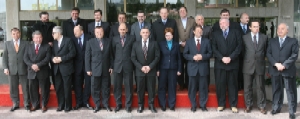
(Photo: Primož Lavre/Salomon 2000)
At an afternoon news conference, Prime Minister Janez Janša said that the region has been intensively developing during the past two years and it remains the second most developed Slovenian region. It meets all the criteria to become a strong, rapidly developing region in the future. The Prime Minister also pointed out that the region’s economic indicators were very good, as the number of local companies has increased by almost five per cent in the past two years; unemployment rate has fallen by almost six per cent since the previous government visit; and other economic indicators are also favourable. An important stimulus for the tourism sector, which generates three quarters of the regional income, will come from the Resolution on National Development Projects for the Period 2007-2023, which contains important projects for Slovenian Istria and the Karst, such as promoting the synergy between the natural and cultural potential of the Karst and the creation of an artificial island in the Adriatic Sea. According to Prime Minister Janez Janša, the latter project is in the study development phase and will, as is the case in certain other developed countries, take into serious consideration various environmental aspects of the project.
The Prime Minister also pointed out that by the end of 2006, 183 different projects were carried out in the region, financed from European funds totalling 14 million euros. Most of these projects focused on regional development, agriculture and fisheries. The Prime Minister welcomed the fact that the region has submitted bids for the funding of future projects totalling 510 million euros for the new Financial Perspective for the EU. If the responsible approach in the realisation of projects continues, then one can expect to see most of the proposed projects being carried out, the Prime Minister said.
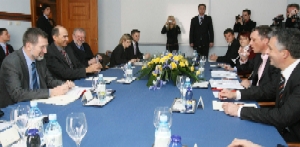
(Photo: Primož Lavre/Salomon 2000)
The Prime Minister gave particular emphasis to the region’s development in the field of university education and today’s meeting with the project group for the University of the Mediterranean, during which the Minister of Higher Education, Dr Jure Zupan, and the Mayor of Piran, Tomaž Gantar, signed a letter of intent relating to the assurance of premises for the seat of the University of the Mediterranean in Portorož. According to the Prime Minister, the University is a large international project which aspires to bridge differences, and which Slovenia aims to win. If Slovenia’s efforts to obtain one of the three seats of the University prove successful, this will considerably open up the region, as it will become a centre for teachers and students from many countries in the Mediterranean region. This would constitute an important contribution towards better multi-cultural dialogue and understanding, while the University would certainly boost the development of Piran and the entire region.
Prime Minister Janez Janša also recapitulated yesterday’s talks with representatives of the Italian ethnic minority. According to the him, the prevailing view shared by both parties throughout the meeting, which focused primarily on concrete problems encountered by members of the minority, was that the status of the Italian ethnic minority has improved in the past two years. In 2006, 15 million euros were allocated for the funding of the community, while this year’s budget is to reach 20 million euros, which is equivalent to almost 10,000 euros per member of the Italian ethnic minority. The Prime Minister also invited the representatives to take an active part in the shaping of the region, as this would present ample opportunities to further meet the needs of the Italian ethnic minority.
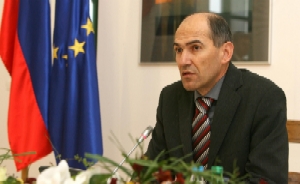
(Photo: Primož Lavre/Salomon 2000)
In his response to a question from the press, the Prime Minister commented on the conditions at Izola General Hospital, saying that the rehabilitation process was successful, as financial losses have been considerably lower during the past two years. He also commented on the action taken by the government in relation to the options of transferring the Kemiplas Company facilities, saying that the government had done everything in its powers to assist in the process, but that the readiness of the company’s owners was essential in order to fulfil the promise given two years ago.
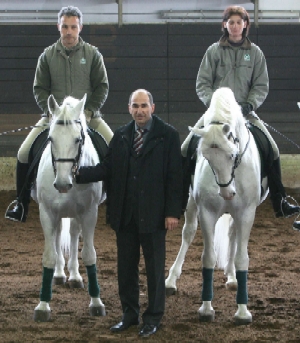
(Photo: Primož Lavre/Salomon 2000)
Later, the Prime Minister and some ministers visited the Lipica Stud Farm Public Institute, where he was informed of the current conditions at the Stud Farm and the objectives achieved in the fields of horse breeding and riding, cultural heritage and tourism. The Prime Minister commended the management of the Lipica Stud Farm for their successful work and encouraged them to pursue the financial consolidation of the Public Institute. On this occasion, the Minister of Defence, Karl Erjavec, and the managing director of the Lipica Stud Farm, Matjaž Pust, signed an agreement on the cooperation of the Ministry of Defence and the Lipica Stud Farm in the creation of a cavalry division of the Slovenian Army.
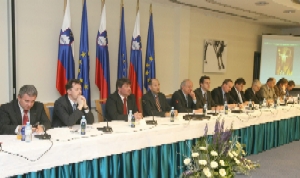
(Photo: Primož Lavre/Salomon 2000)
In the late afternoon, the Prime Minister and government ministers held a meeting with mayors, businesspeople, deputies and state councillors from Slovenian Istria and the Karst. They discussed development trends and the future prospects of the region and answered questions from members of the public.
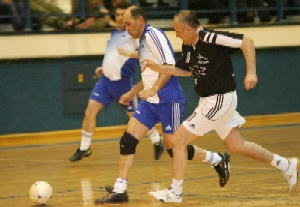
(Photo: Primož Lavre/Salomon 2000)
In the evening, the Prime Minister was one of the key players at the charity football match between the government members’ team and a team of local politicians and businessmen in the village of Hrpelje.
Already the previous day the Prime Minister of the Republic of Slovenia, Janez Janša met with representatives of the Italian minority in Slovenia (more about the meeting).